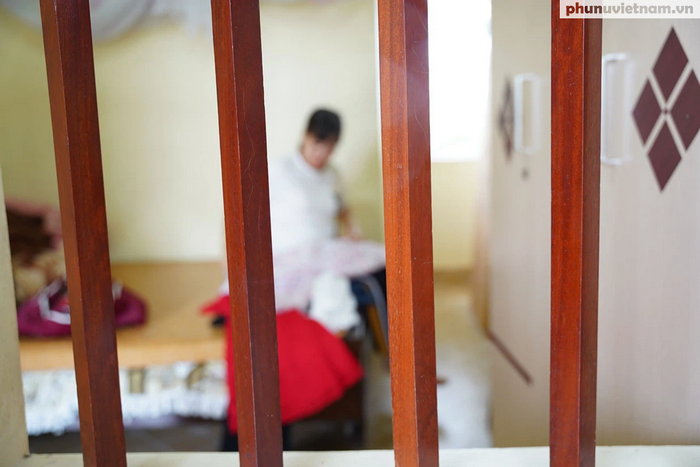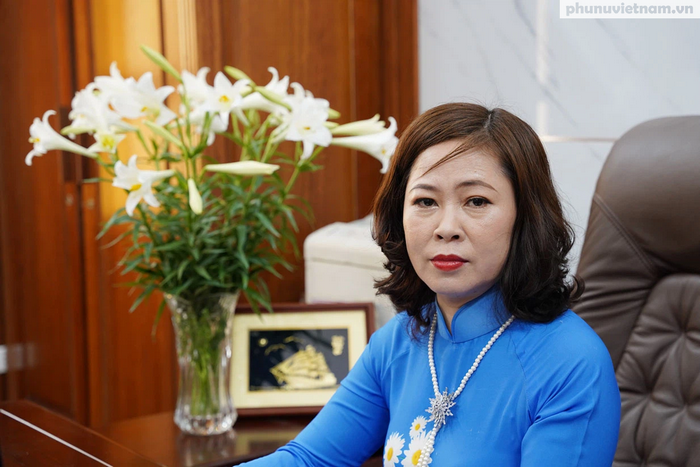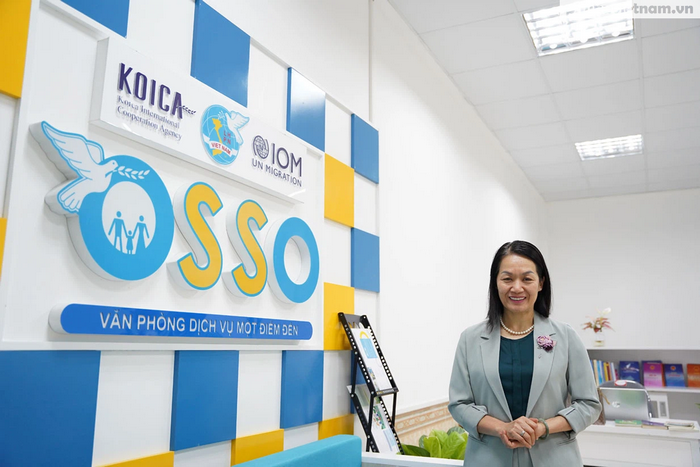Returned migrant women to overcome psychological, legal and financial difficulties
 Ms. Bui Thi Hoa (red shirt), Vice President of the Vietnam Women's Union, and representatives of international organizations and agencies in Vietnam attending the workshop on policy advocacy and sharing research results on repatriated migrant women.
Ms. Bui Thi Hoa (red shirt), Vice President of the Vietnam Women's Union, and representatives of international organizations and agencies in Vietnam attending the workshop on policy advocacy and sharing research results on repatriated migrant women. According to the Ministry of Labour, Invalids and Social Affairs, over 500,000 Vietnamese laborers go abroad every year, in which female workers account for roughly 30%. Tens of thousands of them (more than 90% are women) get married to foreigners, mainly with people from Taiwan (China), China (mainland), the US, Korea, etc. According to Statistics Korea in 2018, the number of couples with the Vietnamese wives make up the highest percentage of multicultural couples in this country.
In reality, not all women married foreigners have a decent life due to language, culture, lifestyle barriers and domestic violence. This leads to an increased number of migrant women returning home to Viet Nam over the years. In Hai Phong city, according to statistics of the City Women's Union, in 2015 – 2020 period there were 6,200 women married to foreigners, of which more than 3,000 married to Koreans. Three hundred women returned home due to unhappy marriage, including 163 mothers with 42 children.

Ms. L.T.G (37 years old in Hai Phong city), a migrant woman returning from Korea
The case of Ms. L.T.G (37 years old, Hai Phong city), a migrant woman returning from Korea, has been reported by the Vietnam Women's Newspaper. Her marriage with the Korean husband lasted only 6 months. Ms. G. found her way back home to face with many difficulties in re-integration into the community such as employment, social stigma, and costly divorce procedures.
The One Stop Service Office (OSSO) in Hai Phong has advised and referred her to KOCUN Office (Korea Center for United Nations Human Rights Policy) for support in completing the divorce procedures in accordance with the law.
The OSSOs are established under the project “Strengthening Vietnamese Capacity for Sustainable Reintegration of Returning Migrants Women and their Households in Vietnam” implemented by the VWU with the sponsorship of Korea International Cooperation Agency (KOICA) through the International Organization for Migration (IOM) in Vietnam.
After more than 1 year, 4 OSSO offices have been established in the project provinces and cities of Hanoi, Can Tho, Hau Giang, Hai Phong and another office is to be established soon in Hai Duong.

Ms. Nguyen Thanh Cam - Head of Law & Policy Department, Project Director with IOM representative and OSSO Hanoi staff
According to the results of the above-mentioned research, 30% of surveyed repatriated migrant women have not completed the divorce procedures; 9/51 children of international marriage have no birth certificates and 67% need legal assistance.
Regarding community reintegration, one third of them often worry about work and income, more than 70% need ipsychological support, particularly someone to talk to and share difficulties in life (66.4%).
"In June 2020, we organized a workshop with service providers from different sectors such as the Justice (Legal Aid Center, Court, Procuracy), Health, Education, Labor - Invalids and Social Affairs, job centers, banks, etc. They are to form a network to support returning women and their children”, Ms. Vũ Thị Kim Liên, President of Hải Phòng WU said.

Ms. Vũ Thị Kim Liên, President of Hải Phòng WU
Since its establishment, Hai Phong OSSO together with other OSSO Offices have reached out and helped many repatriated women with completing divorce procedures, creating stable jobs, and applying for children’s birth certificates.
However, OSSO staff also encounter many difficulties, especially in legal issues. Thus, it needs badly the connection and coordination of relevant ministries and agencies to help solve those women’s problems.
Ms. Nguyen Thanh Cam, Head of Law & Policy Department, Project Director said, "The research shows the requirement for coordination among relevant ministries and sectors. In addition, the research also revealed policy gaps in supporting repatriated migrants. These are the basis for making proposals of policies and laws amendment in this area”.

Ms. Bui Thi Hoa, VWU Vice President, at Hai Phong OSSO Office
For project orientation, Ms. Bui Thi Hoa asked the project staff to have stronger connection with other services in phase 2. In addition to psychological, legal and employment counseling services, there should be more direct support such as vocational training to facilitate the women’s faster reintegration. Each of the women should have a stable job, balanced mentality and a more decent position in the family as well as in the community so as to have a more stabilized life.






